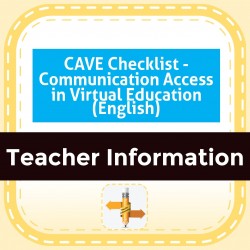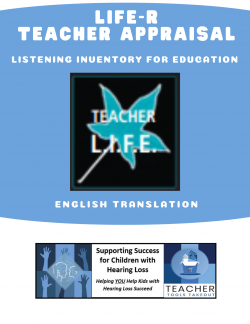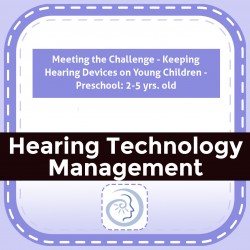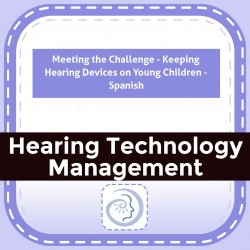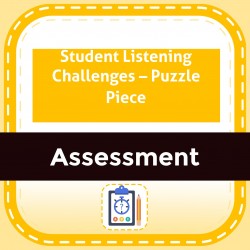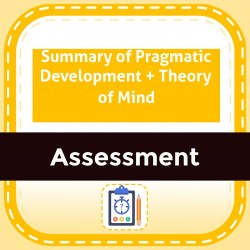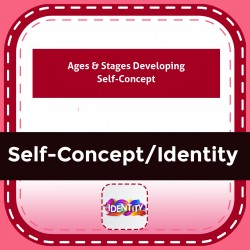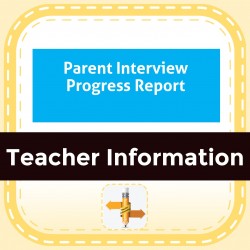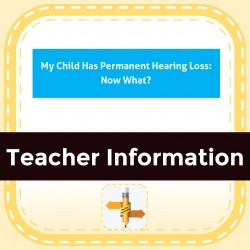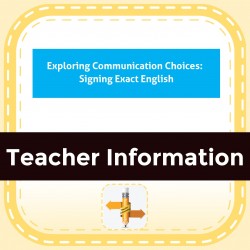Ability Levels
Categories
Resource Types
Age/Grade Range
CCSS
Anchor Standard
Speaking & Listening
Language
Reading
CAVE Checklist - Communication Access in Virtual Education (English)
$ 0
The CAVE Checklist is a self-report checklist is intended to be completed students age 9 and above who are deaf or hard of hearing to identify possible communication access issues that may occur durin
...
g virtual education situations. It is recommended that the CAVE be completed in an interview format with the DHH specialist discussing each situation with the student. Students read 10 questions related to accessing communication in online learning situations and rate them from Always Easy to Always Difficult, or Doesn't Happen. A total score can be obtained. Not every situation will apply to every student. Situations indicating appropriate access will receive scores of 4 or 5. Items scoring 1, 2, 3, need to be addressed for appropriate access needs. The 10 questions are followed by a list in which the student identifies what he or she thinks helps most during online learning.
LIFE-R Teacher Appraisal - Fillable
$ 2
Listening Inventory For Education - Revised Teacher Appraisal of listening challenges and self-advocacy behaviors of students with hearing loss. Computer fillable version.
Meeting the Challenge - Keeping Hearing Devices on Young Children - Preschool: 2-5 yrs. old
$ 0
Brochure specifying what makes it challenging to keep hearing aids on 2-5 yrs old, why hearing aids are needed, and strategies to help keep them on, including hearing aid retention devices.
Meeting the Challenge - Keeping Hearing Devices on Young Children - Spanish Version
$ 0
Brochure specifying what makes it challenging to keep hearing aids on 0-24 month old babies and 2-5 yrs. old preschoolers, why hearing aids are needed, and strategies to help keep them on, including h
...
earing aid retention devices.
Student Listening Challenges – Puzzle Piece
$ 3
Student Listening Challenges – Understanding the Missing Pieces summarizes the results of a Functional Listening Evaluation in a way that helps educators and family members understand listening challe
...
lenges under the different conditions of near, far, in quiet and in noise. Includes an image of a story imposed on puzzle pieces with different parts of the text missing to correlate with decreased speech perception due to hearing loss and listening under different auditory challenges.
Summary of Pragmatic Development + Theory of Mind
$ 0
This chart provides age ranges for theory of mind development and social interaction behaviors of the typically developing child. Children with hearing loss are often significantly delayed in pragmati
...
c language and/or Theory of Mind and their development should be monitored closely.NOTE: This is for Teacher Tools Members ONLY
Ages & Stages Developing Self-Concept
$ 0
Self-concept develops from infancy through childhood. This resource describes the stages of self-concept development for ages birth through 2 years, 3-4 years, and 5-6 years. Useful for educational pl
...
anning and understanding behavior, along with the need to strengthen self-concept development.
Parent Interview Progress Report
$ 0
This checklist is designed to be part of biannual discussions and monitoring between early intervention professionals and family members of infants and toddlers with hearing loss. Family members are a
...
sked to consider the different areas that can affect the rate that communication skills develop and how often their child receives attention to each of these considerations. Areas covered are: Auditory Communication, Visual Communication, and Effective Communication Strategies.
My Child Has Permanent Hearing Loss: Now What?
$ 0
Once a child is diagnosed with hearing loss family members have many questions. This resource provides information addressing how overwhelming the diagnosis can be and families may have many feelings
...
about the testing process and the diagnosis. It describes where you can find help and support and why it is important to start services shortly after the hearing loss is diagnosed.
Exploring Communication Choices: Signing Exact English
$ 0
This resource explores the choice of using Signed Exact English as a communication option for developing or enhancing language development for children who are hard of hearing or deaf.
...
 Your browser is out of date. For best experience switch to latest updated Browser.
Your browser is out of date. For best experience switch to latest updated Browser.
 Get Chrome
Get Chrome Get Edge
Get Edge Get Firefox
Get Firefox